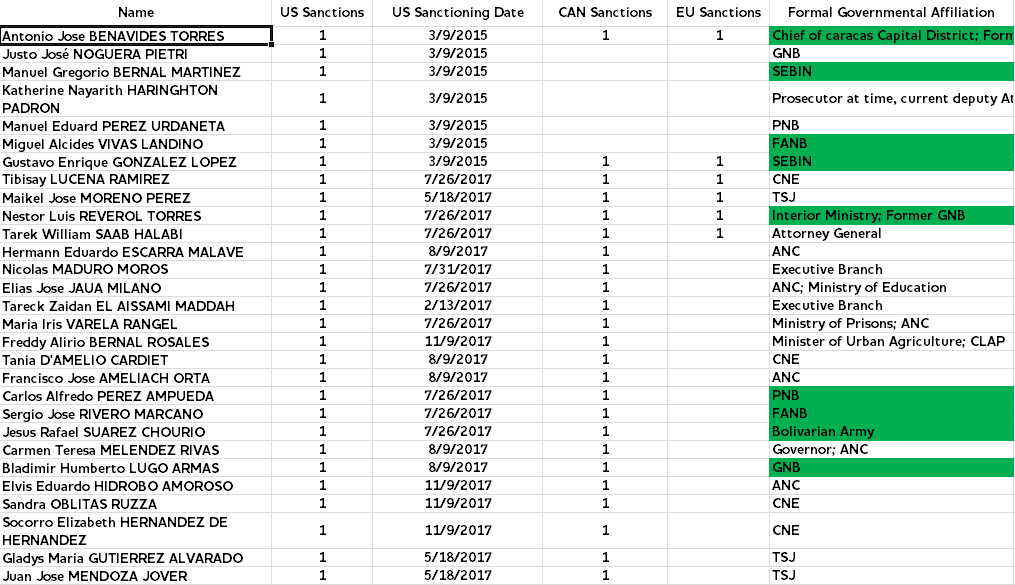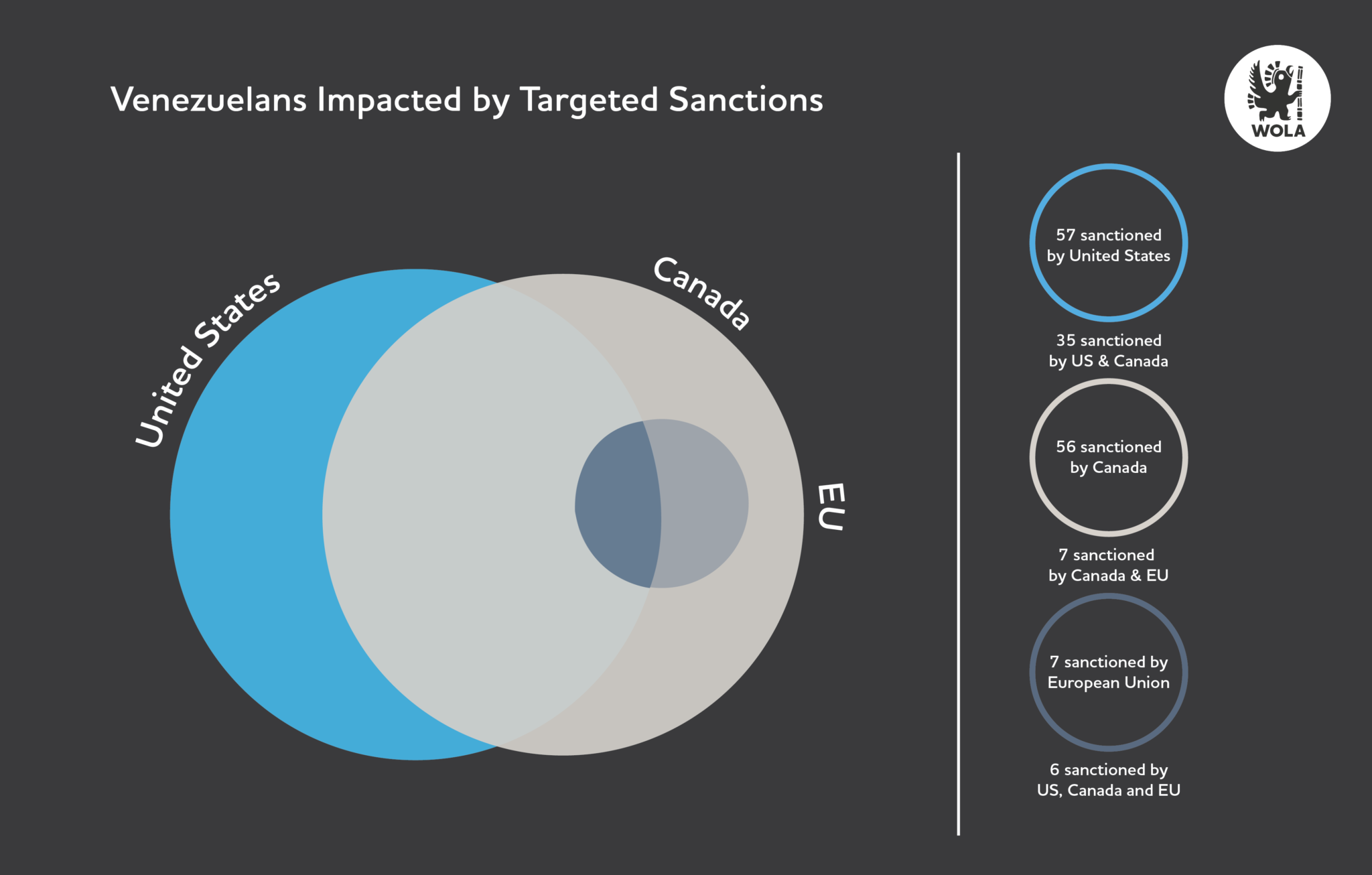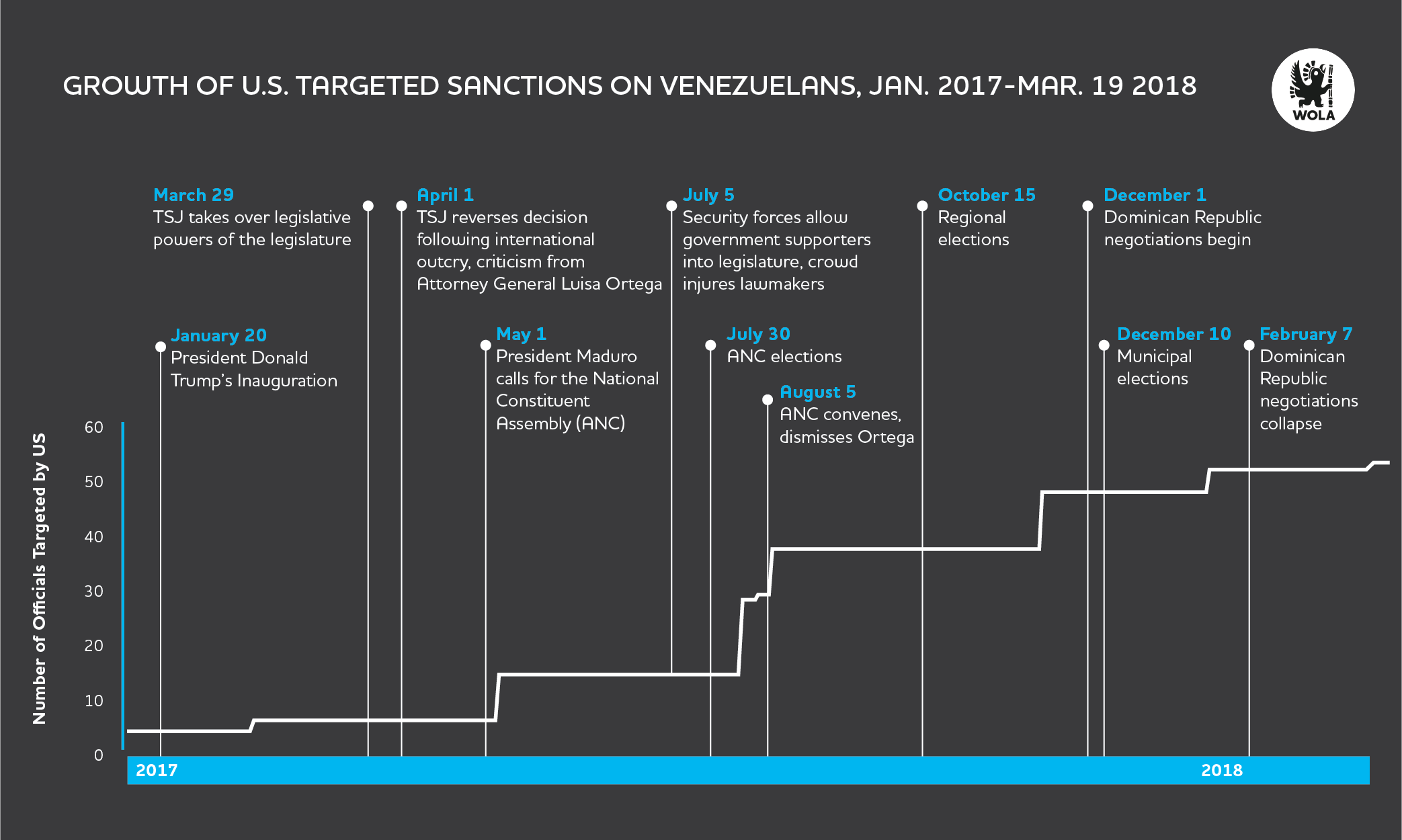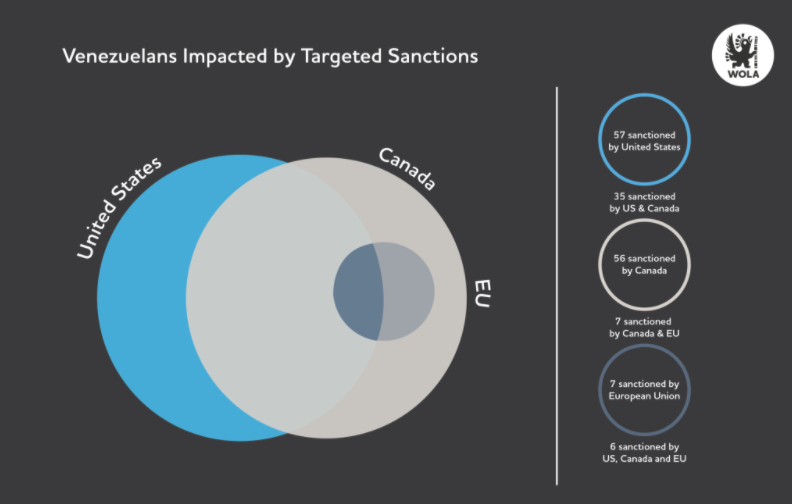The deepening of Venezuela’s political crisis has coincided with important shifts internationally. In the United States, the Trump administration has been much more responsive to calls from domestic pressure groups and political actors lobbying for more aggressive action on Venezuela. At the same time, the rest of the regional and international communities have come to an increasing consensus on the need to place diplomatic pressure on the Maduro government.
A large component of this response has centered around sanctions—and on sanctions against Venezuelan officials and elite individuals in particular. While the strategy of freezing officials’ assets and denying them visas as a political pressure tactic began with the Obama administration’s Executive Order 13692 in 2015, it has dramatically accelerated under the Trump administration. Of the 57 Venezuelan officials and prominent figures that have been added to the Office of Foreign Assets Control’s list of “Specially Designated Nationals” under this strategy of targeted sanctions, 50 (roughly 88 percent) have been added under Trump.
This strategy has become increasingly multilateral, a development that the academic literature on sanctions suggests may make them more effective. In late 2017 the Canadian government issued its own targeted sanctions in two separate rounds against 56 officials, and the European Union followed by sanctioning seven in January. While the governments of Colombia, Mexico, and Panama have all issued statements in support of U.S. sanctions, to date no Latin American government has followed through by implementing targeted sanctions of its own.
These sanctions are “multilateral” in the sense that a number of countries are carrying out the same policy. They are not, however, multilateral in the sense of being the product of an openly-coordinated effort. This analysis seeks to explore the extent of multilateralism in the targeted sanctions that have been imposed so far, and to assess their impact on the ground. It is important to do so because, as we have cautioned in the past, placing sanctions on officials may give them more, not less, incentive to support the Maduro government. This is especially true if the conditions necessary for these sanctions to be lifted are not communicated clearly and frequently.
For this reason, we have compiled a public database mapping out the targeted sanctions so far, which we will update as sanctions lists expand. This database includes the name of the official, their affiliation in government, and the country/regional bloc issuing sanctions.
See: Venezuela Targeted Sanctions Database

While it is hard to make generalizations about targeted sanctions based on this list, compiling them and assessing the specific targets allows for some broad observations. These include:
Notable absences – There are conspicuous absences in the U.S. sanctions list. Unlike Canada, the U.S. has not sanctioned either PSUV heavyweight Diosdado Cabello, Defense Minister Vladimir Padrino López, or the Rodriguez siblings Delcy and Jorge, figures that are widely accused of being complicit in Venezuela’s authoritarian slide (the E.U. has sanctioned Cabello, but none of the others). All are significant powerbrokers in Maduro’s inner circle. The fact that the United States has avoided sanctioning them—despite the insistence of Marco Rubio and other conservatives—may be an implicit recognition of targeted sanctions’ ability to bind officials to the Maduro government rather than encourage a split. This, then, raises the question of the other ways in which the U.S. government may be reaching out to them, and what messages it may be communicating.
A coordination gap? – There appear to be important differences in the focus of the U.S., Canada and E.U. sanctions. Looking at the targets shows there is significant, but not complete overlap: 6 individuals have been sanctioned by all three entities, 35 by Canada and the United States, and just one by only the E.U. and Canada and not the U.S. (Cabello).This gap in overlap suggests differences between governments in the overall strategy behind each of their sanctions regimes.

(Click to see full-size graphic)
This, in turn, poses problems to those hoping to make targeted sanctions more multilateral by encouraging Latin American countries to adopt them. Who should Colombia, Panama, or Mexico sanction, for example, when there is a discrepancy between existing targets? On the other hand, there is a chance that authorities may be interpreting this discrepancy as a feature of the sanctions regime, rather than a bug.
Some theorize that targeted sanctions are most effective on those who have not been targeted, who act out of fear of being added to the list—indeed, some analysts claim that Luisa Ortega is an example of this dynamic in action. Assuming this is true, then some discrepancy among the lists could be positive, as it provides multiple levels of incentives (e.g., an individual on the U.S. sanctions list could still break from the government out of fear of being added to the E.U. or Canadian lists).
Different focuses – The lack of perfect overlap may be explained in part by differing mandates for the sanctions. Whereas the Europeans and Canadians frame their sanctions as being aimed at officials who undermine Venezuela’s democratic institutions and violate human rights, the Obama administration’s executive order in 2015 (which the Trump administration has continually renewed, most recently on March 2) casts a wider net, allowing for sanctions against officials also involved in “significant acts of violence” and “public corruption.” This may account for the larger pool of officials affected by U.S. sanctions compared to the E.U. and Canada, but it still does not explain the notable absences listed above—many of whom are widely alleged to be involved in corruption schemes.
Sanctions have little impact on the behavior of those who have been targeted – The U.S. targeted sanctions are often described—at least in Washington—as having a positive impact in defending democratic institutions in Venezuela. While the State Department has declined to give specific examples of their success when asked, public statements accompanying recent sanctions paint them as part of a strategy of halting the country’s drift into authoritarianism. The May 2017 announcement of sanctions against eight Venezuelan supreme court justices, for instance, cited Secretary of the Treasury Steven Mnuchin as saying that the sanctions are supporting the Venezuelan people “in their efforts to protect and advance democratic governance in their country.”
However, a simple look at the timeline of the country’s trajectory since then shows the sanctions have not been effective at modifying the Maduro government’s behavior. This is not to say that sanctions are not restricting where targeted officials can travel or invest, or potentially serving as a signal to those who have not yet been named. But it is clear that the deterioration of Venezuelan democracy has continued despite the rollout of targeted sanctions. Indeed, further research could show these sanctions may have even contributed to this deterioration.

(Click to see full-size graphic)
Under Trump, fewer sanctions against active security forces personnel – Tracking who exactly is an active member of Venezuelan security forces is difficult, partly because the line between the military and civilian governance has become so blurred, and so many civilian authorities are retired or non-active military officials. However, comparing media reports on Venezuela’s armed forces hierarchy to the sanctions list and the date of the sanctions suggests an interesting pattern. According to available evidence, of the 50 officials sanctioned under the Trump administration, the U.S. government has only sanctioned eight serving in the security forces (police and military) at the time of their addition to the list—16 percent of the whole. While this is more than the five active security force officials sanctioned under Obama in his 2015 executive order, the share of security force targets was far higher in the previous U.S. administration (five of seven, or 71 percent. And one of the remaining two was, while not at time of sanctioning, a former leader of the GNB).
As with its reluctance to sanction Diosdado Cabello and other key actors, this could reflect a desire to avoid tying their fate to that of Maduro. Such a strategy would be in line with the Trump administration’s overall approach to Venezuela, which places a much higher emphasis on the role of security forces in supporting a transition. While officially the U.S. denies that it supports regime change, the importance of the Venezuelan military has been echoed at nearly every level of U.S. foreign policy, from Trump’s support for a vague “military option,” and Secretary Tillerson’s open talk about the possibility of a military coup, to Chargé d’Affaires Todd Robinson’s recent remarks about the importance of the military in determining the country’s future.
*Note: WOLA interns Melissa Medina-Márquez and Valeria Guevara provided invaluable assistance in preparing this commentary, particularly in researching the database and creating the graphics.



